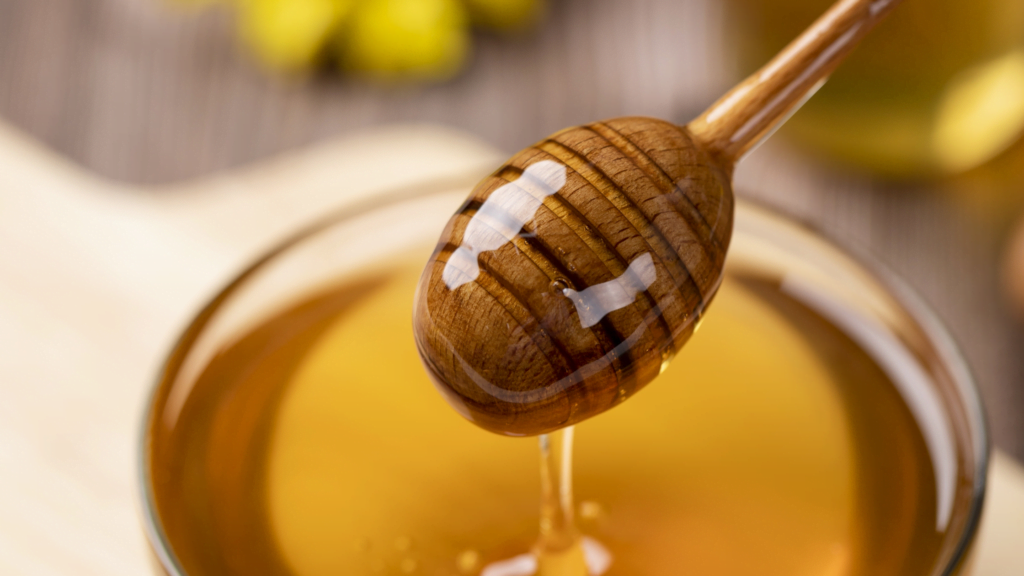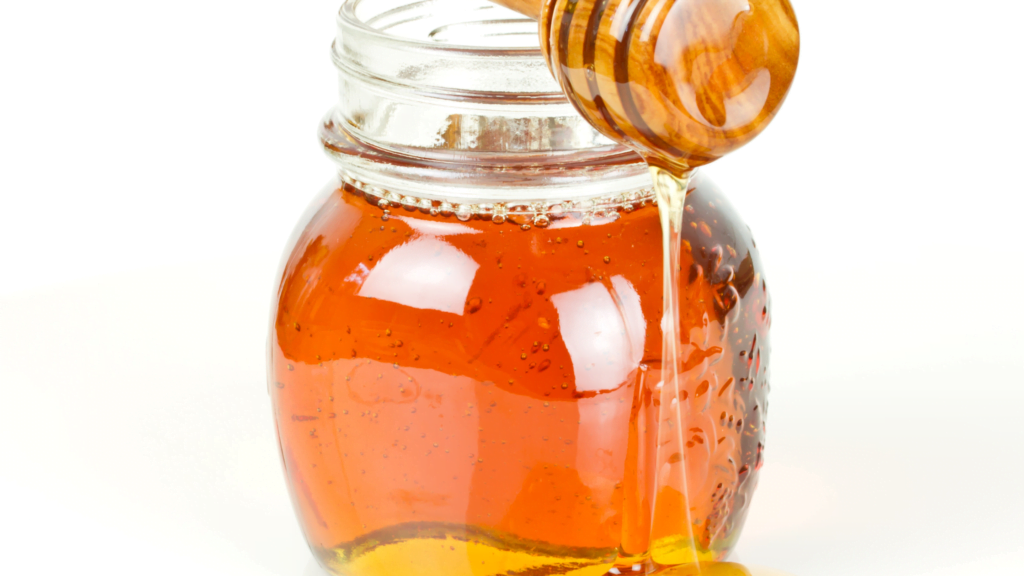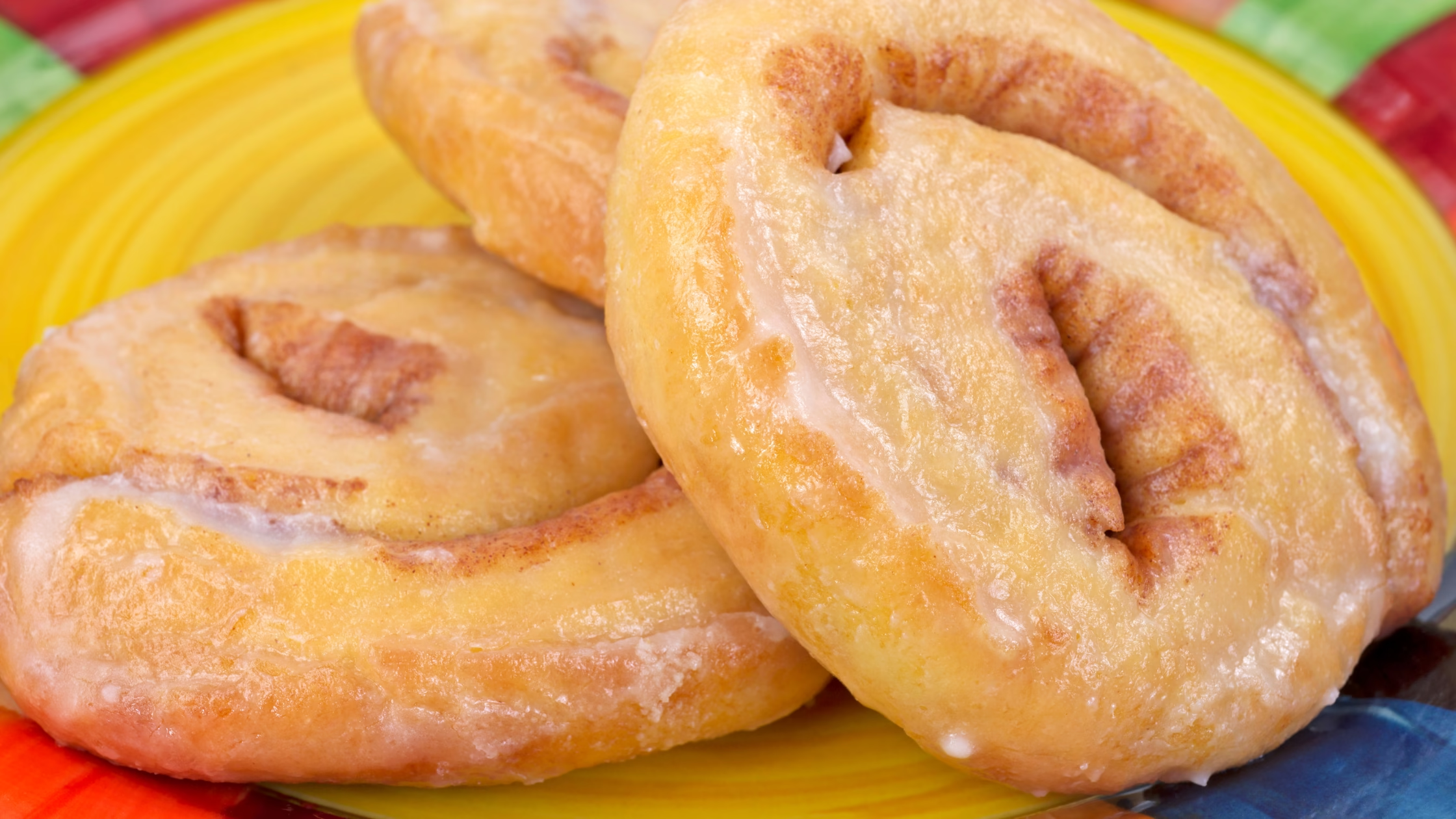As a dog owner, you may have heard that honey has many health benefits for humans, such as boosting immunity and soothing sore throats. But what about dogs? Can dogs eat Honey Buns? Is honey toxic for dogs? , a popular snack food that contains honey? This article will explore the potential risks and benefits of feeding your dog honey and honey buns.
What are Honey and Honey Buns?
Honey is a sweet, viscous liquid made by bees from the nectar of flowers. Humans use it as a popular natural sweetener in cooking and baking and a natural remedy for various health issues.
On the other hand, honeybuns are a popular snack food that contains honey as one of the ingredients. They are typically made from flour, sugar, oil, and honey. They are often sold pre-packaged in convenience stores and supermarkets.
While honey is a natural and nutritious food for humans, it’s important to remember that dogs have different nutritional needs and digestive systems. Before feeding your dog honey or honey buns, it’s essential to understand the potential risks and benefits, which we’ll explore in the following sections.
Nutritional Value of Honey and Honey Buns
Honey is a natural sweetener that contains a variety of nutrients and antioxidants. It’s high in carbohydrates, with one tablespoon of honey containing about 17 grams of carbohydrates. Honey also contains small amounts of vitamins and minerals, such as vitamin C, calcium, and iron.
The nutritional value of honey buns largely depends on the other ingredients they contain, such as flour, sugar, and oil. Honeybuns, on the other hand, are typically high in calories, sugar, and unhealthy fats. They are not nutritious for humans or dogs and should be consumed in moderation, if at all.
When it comes to feeding your dog, it’s essential to understand their nutritional needs and provide them with a balanced diet that meets those needs.
While honey can be a healthy addition to your dog’s diet in moderation, honey buns are not recommended due to their high sugar and fat content.
Instead, there are other nutritious foods that you can give your dog as a treat or snack, which we’ll explore in the following sections.
Can Dogs Eat Honey?
Yes, dogs can eat honey in moderation. Honey is a natural sweetener with antioxidants and anti-inflammatory and antibacterial properties. It’s also a good energy source and can be a healthy addition to your dog’s diet.
However, it’s important to remember that honey is high in sugar, so it should only be given to your dog in small amounts. Too much honey can lead to weight gain, tooth decay, and other health issues. Additionally, you should avoid giving honey to dogs with diabetes or those who are overweight or obese.
When giving honey to your dog, it’s best to start with a small amount and monitor their reaction. Some dogs may be allergic to honey or have difficulty digesting it, leading to digestive issues. Suppose your dog experiences adverse reactions after eating honey, such as vomiting or diarrhea. In that case, you should stop giving it to them and consult a veterinarian.
Is Honey Toxic for Dogs?

While honey is generally safe for dogs to consume, it can be toxic in certain circumstances. Raw honey, which is unprocessed and unpasteurized, may contain botulism spores that can harm dogs. These spores can grow and produce a toxin called botulinum, leading to botulism, a severe and potentially life-threatening condition.
To reduce the risk of botulism, it’s recommended that you only give your dog commercially available honey that has been pasteurized and processed. Additionally, you should avoid giving honey to puppies under one-year-old. Their immune systems are not fully developed and may be more susceptible to botulism.
It’s also important to remember that honey is high in sugar, so it should only be given to your dog in moderation. Too much honey can lead to weight gain, tooth decay, and other health issues. If you’re unsure whether honey is safe for your dog to consume, you should consult a veterinarian.
Can Dogs Eat Honey Buns?
Giving honey buns or other similar human snacks to dogs is not recommended. Honey buns are typically high in calories, sugar, and unhealthy fats, which can lead to weight gain, obesity, and other health issues in dogs. Additionally, honey buns often contain other ingredients, such as chocolate or raisins, which can be toxic to dogs.
While a small amount of honey bun as an occasional treat is unlikely to cause harm to your dog, it’s best to avoid feeding them to your pet altogether. Instead, there are other nutritious and safe treats that you can give your dog, such as fruits, vegetables, or specially-made dog treats that are low in sugar and calories.
Suppose you suspect your dog has consumed a significant amount of honey buns or any other food that may be harmful to them. In that case, you should contact your veterinarian immediately.
Also Read: Can Takis Kill Dogs? What You Need to Know
Potential Risks of Feeding Honey and Honey Buns to Dogs
While honey can be a healthy addition to your dog’s diet in moderation, there are potential risks associated with feeding honey and honey buns to dogs.
One of the main risks associated with honey is the potential for botulism, a severe and potentially life-threatening condition.
Raw honey may contain botulism spores that can grow and produce a toxin called botulinum, which can lead to botulism.
To reduce the risk of botulism, it’s recommended that you only give your dog commercially available honey that has been pasteurized and processed.
Another risk associated with feeding honey and honey buns to dogs is their high sugar content. Too much sugar can lead to weight gain, tooth decay, and other health issues in dogs. Also, honey buns are often high in unhealthy fats, contributing to weight gain and other health problems.
Finally, honey buns may contain other ingredients, such as chocolate or raisins, which can be toxic to dogs. Chocolate can harm dogs and cause vomiting, diarrhea, and other symptoms, while raisins can cause kidney failure.
To ensure the health and safety of your dog, it’s best to avoid feeding them honey buns and other human snacks high in sugar, unhealthy fats, or potentially toxic ingredients. Instead, stick to a balanced diet that meets their nutritional needs. Consult with a veterinarian if you have any questions or concerns.
Benefits of Honey for Dogs

Honey can offer several potential benefits for dogs when given in moderation.
Firstly, honey is a natural sweetener that contains antioxidants, which can help to support your dog’s immune system and protect against free radical damage. Honey also has anti-inflammatory and antibacterial properties, which can help to soothe and heal minor cuts and wounds.
Honey is also a good energy source for dogs. It contains natural sugars that can provide quick energy when needed. Also, honey is a natural cough suppressant that can help soothe a sore throat and reduce coughing.
Furthermore, honey has been shown to have prebiotic effects, which means that it can help to promote the growth of beneficial bacteria in your dog’s gut and improve its digestive health.
It’s important to remember that honey should only be given to your dog in small amounts, as it is high in sugar and calories. Additionally, you should always use commercially available honey that has been pasteurized and processed, as raw honey may contain botulism spores that can harm dogs.
Overall, honey can be a healthy addition to your dog’s diet when given in moderation and as part of a balanced diet.
Alternatives to Honey and Honey Buns for Dogs
Suppose you’re looking for safe and nutritious alternatives to honey and honey buns for your dog. In that case, there are several options to choose from:
- Fresh fruits: Many fruits, such as apples, bananas, blueberries, and watermelon, are safe and healthy for dogs. They are low in calories and high in vitamins and minerals that can benefit your dog’s health.
- Vegetables: Vegetables like carrots, green beans, and sweet potatoes are also great options for dogs. They are low in calories and high in fiber, vitamins, and minerals.
- Peanut butter: Peanut butter is a popular and nutritious dog treat, high in protein, healthy fats, and vitamins. However, it’s essential to choose natural peanut butter without added sugar or salt and to give it to your dog in moderation.
- Yogurt: Plain, unsweetened yogurt is another healthy option for dogs. It is high in protein and contains beneficial probiotics that can improve digestive health.
- Specially made dog treats: Many commercially available dog treats are specifically formulated to be healthy and nutritious. Look for treats that are low in calories and sugar and contain natural ingredients like chicken, beef, or fish.
When choosing treats for your dog, it’s essential to read the ingredient label carefully and choose safe and healthy treats for your pet. Additionally, treats should only make up a small portion of your dog’s overall diet rather than replace a balanced and nutritious diet.
How Much is Honey Safe for Dogs?
While honey can be a healthy addition to your dog’s diet in moderation, giving it to them in the right amount is essential.
The recommended serving size of honey for dogs is one teaspoon per day for small dogs and no more than two teaspoons per day for larger dogs. It’s important to remember that honey is high in calories and sugar, so that overfeeding can lead to weight gain and other health issues.
Additionally, you should always choose commercially available honey that has been pasteurized and processed, as raw honey may contain botulism spores that can harm dogs.
If you have any concerns about feeding honey to your dog or if they have any underlying health issues, it’s always best to consult with a veterinarian before adding honey to their diet. They can help you determine the correct serving size and ensure that honey is safe for your dog.
Signs of Allergic Reaction in Dogs
Like humans, dogs can develop allergies to a wide range of substances, including foods like honey and honey buns. If your dog is allergic to honey, it may exhibit one or more of the following signs of an allergic reaction:
- Skin irritation: Allergic reactions in dogs often manifest as skin irritations, such as itching, redness, and swelling. Your dog may scratch, lick, or bite at their skin to relieve the discomfort.
- Digestive problems: Allergies can also affect your dog’s digestive system, causing vomiting, diarrhea, and abdominal pain.
- Respiratory problems: In some cases, allergies can cause respiratory symptoms in dogs, such as coughing, sneezing, and difficulty breathing.
- Behavioral changes: Allergies can also cause behavioral changes in dogs, such as lethargy, restlessness, and anxiety.
If you suspect that your dog has an allergic reaction, it’s essential to seek veterinary care as soon as possible. Your veterinarian can perform a physical exam and diagnostic tests to determine the cause of your dog’s symptoms and provide appropriate treatment. Sometimes, allergic reactions can be life-threatening, so prompt veterinary care is essential.
Other Human Foods Dogs Should Avoid
While many human foods are safe and healthy for dogs, some should be avoided as they can be harmful or toxic. Here are some human foods that dogs should avoid:
- Chocolate: Chocolate contains theobromine, which is toxic to dogs and can cause symptoms like vomiting, diarrhea, tremors, and seizures.
- Grapes and raisins: Grapes and raisins can cause kidney failure in dogs, even in small amounts.
- Onions and garlic: contain compounds that can damage dogs’ red blood cells and cause anemia.
- Avocado: Avocado contains a toxin called persin that can cause vomiting and diarrhea in dogs.
- Alcohol: Alcohol can cause alcohol poisoning in dogs, leading to symptoms like vomiting, diarrhea, difficulty breathing, and even coma or death.
- Xylitol: is a sugar substitute commonly found in sugar-free gum, candy, and other products. It can cause a rapid insulin release in dogs, leading to hypoglycemia (low blood sugar), seizures, and liver failure.
- Fatty foods: High-fat foods like bacon, sausage, and butter can cause digestive upset and pancreatitis in dogs.
It’s important to remember that dogs have different nutritional needs than humans, and some foods that are safe for us can harm them. Keep potentially harmful foods out of their reach. Always check with your veterinarian before feeding your dog any new foods.
Importance of a Balanced Diet for Dogs
A balanced diet is essential for dogs to maintain optimal health and well-being. A diet that provides all the necessary nutrients in the right amounts can help prevent disease, maintain a healthy weight, and promote healthy skin and coats.
A balanced diet for dogs should consist of the following:
- Protein: Dogs need protein to build and repair tissue, maintain healthy skin and coat, and support a healthy immune system. High-quality sources of protein include meat, fish, eggs, and legumes.
- Carbohydrates: Carbohydrates provide energy for dogs and are an essential fiber source, promoting digestive health. Good sources of carbohydrates include whole grains, vegetables, and fruits.
- Fats: Fats are a concentrated energy source essential for healthy skin and coat, brain function, and hormone production. Good fat sources include fish oil, flaxseed oil, and chicken fat.
- Vitamins and minerals: Vitamins and minerals are essential for maintaining a healthy immune system, promoting strong bones and teeth, and supporting overall health. Good sources of vitamins and minerals include fruits, vegetables, and supplements.
A balanced dog diet should also consider their age, breed, size, and activity level. Puppies, for example, need more protein and fat than adult dogs. At the same time, seniors may require fewer calories to maintain a healthy weight.
If you need to check if your dog’s diet is balanced or if you’re considering changing its diet, it’s always best to consult a veterinarian. They can help you determine the best diet for your dog’s needs and ensure they’re getting all the nutrients they need to stay healthy.
Tips for Keeping Your Dog Safe and Healthy
As a pet owner, you must keep your dog safe and healthy. Here are some tips to help you do just that:
- Provide a balanced diet: As discussed earlier, a balanced diet is essential for dogs to maintain optimal health and well-being. Make sure to provide your dog with a high-quality, nutritious diet that meets its individual needs.
- Provide fresh water: Make sure your dog has access to clean water at all times. This is especially important during hot weather or if your dog is active.
- Regular exercise: is essential for maintaining your dog’s physical and mental health. Take your dog for daily walks or runs, play fetch, or engage in other activities that get them moving.
- Visit the vet regularly: Regular check-ups with a veterinarian can help prevent and detect health issues early on. Ensure your dog is up to date on their vaccinations and preventative care, such as heartworm prevention.
- Groom your dog: Regular grooming can help keep your dog’s coat healthy and shiny, prevent matting and tangles, and remove parasites like fleas and ticks.
- Please keep your dog safe: Make sure it is always safe by keeping them on a leash when in public, using a secure fence around your yard, and keeping harmful substances out of its reach.
- Provide mental stimulation: Dogs need mental stimulation as much as physical exercise. Provide your dog with toys, puzzles, and games that challenge their mind and keep them entertained.
Following these tips can help keep your dog safe, healthy, and happy for years.







